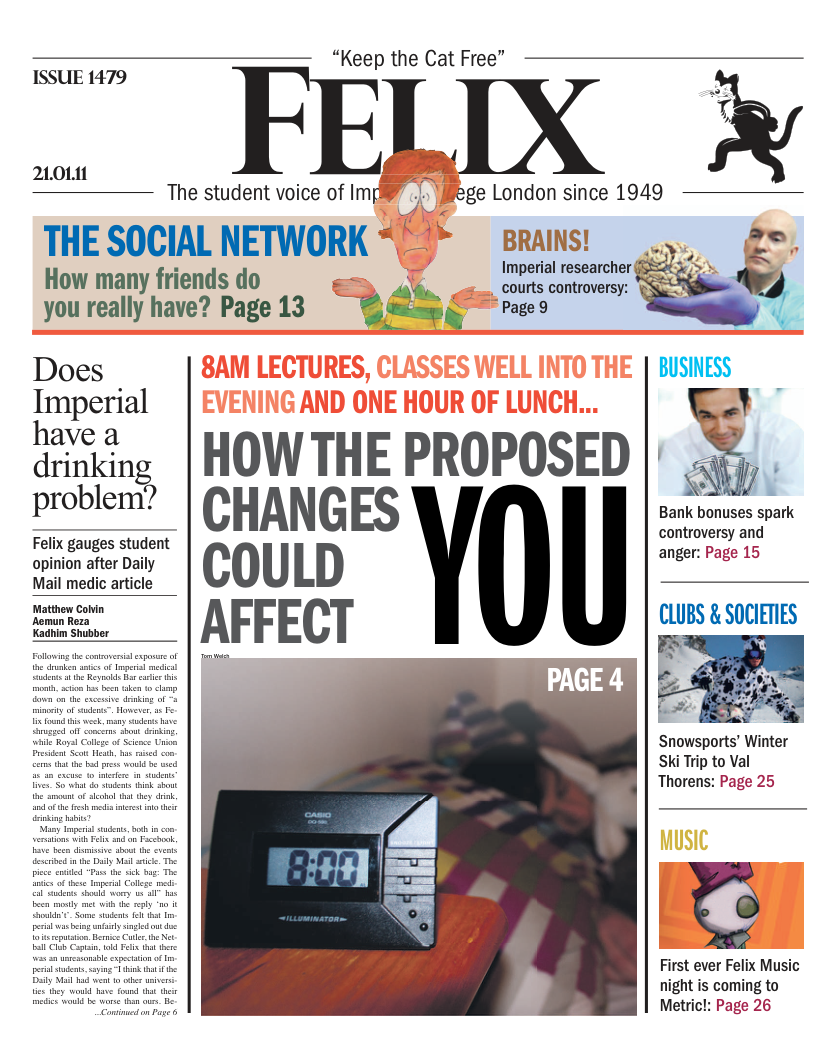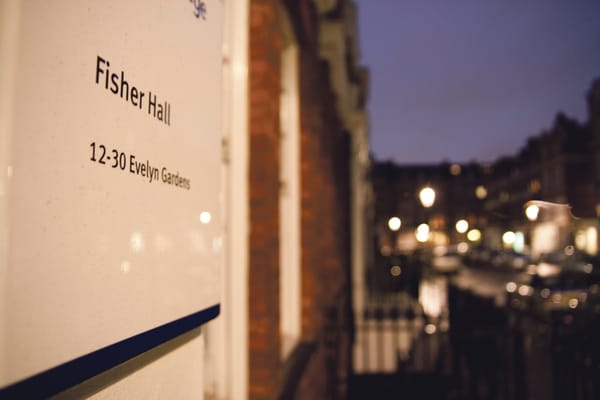Feasibility of longer day called into question
Proposed timetable changes criticised by students and staff

It came as a shock to many last week when Felix reported that a College committee is investigating changes to the length of the College day. The proposals, which include extending the day to 8am until 7pm for undergraduates and until 8pm for postgraduates, on Mondays and Thursdays, are still under consideration but they have been treated with apprehension by students and members of staff alike, many of whom were not officially informed of the proposals. The first meeting of the committee on Monday 17th January was cancelled at short notice for unknown reasons.
Imperial College Union has raised a number of concerns about the widespread effect of the changes including: the possible negative impact on participation in clubs and societies, reduced attendance in lectures, the impact on participation in humanities courses and the negative impact on student welfare.
Pro-Rector for Education, Professor Julia Buckingham, said that the proposals would help Imperial “use [its] teaching space most effectively and ensure that [it could] accommodate the growing number of Master’s courses and extra-curricular programmes the College offers.” She reassured students and staff that the committee was simply investigating the proposals and that any recommendations that it made would “be given further consideration at both the Strategic Education Committee and the College’s Management Board.”
Professor Omar Matar, Director of Undergraduate Studies (DoUG) for Chemical Engineering acknowledged that the changes were being proposed “with the best of intentions, to create more flexibility in the timetable”. However, he questioned the need for them, saying: “We haven’t asked for an extension to the College day.” He told Felix that he was “confident that we will not need to schedule any undergraduate lectures from 8am-9am or from 6pm-7pm. However, Professor Angus Mackinnon, Director of Undergraduate Studies for Physics, said that though he was “not a fan of the proposed change”, he would be forced to use it due to the “timetable congestion in [the] Physics [department].”
Colin Kerr, the Departmental Administrator for Civil Engineering, concurred: “If we were to extend the day, it would make the job of timetabling classes easier. There would be less clashing of modules and it would be possible to offer a range of options.”
Professor Buckingham said the College is “approaching a limit on the teaching space available for all the activities undertaken day to day.”
Professor Matar told Felix that neither he nor his colleagues had been consulted: “The proposed changes haven’t been discussed with me and I have consulted with a number of my colleagues and they haven’t been discussed with them either.” The sentiment was shared by other members of staff, many of whom had not heard of the proposals.
A spokesperson for UCL confirmed that lectures there start at 9am, although “Undergraduate Computer Sciences teaching occasionally starts at 8am”. The last lectures are from 4pm-5pm according to the spokesperson.
There has been significant concern about the impact of early morning lectures on the welfare of both students and staff. Professor Mackinnon pointed out that “there are bound to be serious problems for staff […] who have to organise childcare.” He also expressed his sympathy for students and staff who might have a lecture at 8am and also at 6pm in the same day: “I’d hate to be either a lecturer or a student who found himself with lectures at both 8am and 6pm.” Charlotte Ivision, Deputy President (Welfare), argued that a longer day would take a “physical toll on students in terms of fatigue and in terms of less flexibility when it comes to managing their free time.” One Director of Undergraduate Studies told Felix privately, “the general effect would be tiring for students”.
Professor Buckingham told Felix that “that any new arrangements must be family friendly” and that staff and students would not be expected to work longer hours.
Professor Mater argued that it would be difficult for some staff to attend 8am lectures: “I know a lecturer who lives in Peterborough, another who lives in Reading. It will be extremely difficult for them to teach lectures at 8am.” He also questioned the likely attendance rate of students saying: “I’m not entirely sure what the attendance of students will be like for early or late lectures. We know that attendance at 9am lectures is less than at other times.”
Postgraduate students, however, were generally more receptive to the ideas. While Ritika Gupta, a masters student in biomedical engineering, said that she thought that “it’s hard enough to cope with the timetable at the moment” and others said that since they already had to stay in college for most of the day they wouldn’t mind their lectures being spread over a longer period. Charlotte Ivision, Union Deputy President (Welfare), raised concerns about the well-being of students affected by the changes. She said there could be problems for “mature students with children and students from certain ethnic backgrounds who may have home commitments requiring them to be at home in the time currently free”.
Zahra Kadom, a representative of the Ahulul Bayt Islamic Society, commented that the changes would be problematic in the months of Ramadan, during which “a lot of people travel to their local mosques to attend services”, usually between “6-7pm, which would clash with the proposed timetabling.”
Stephen Long, an Ordinary Member of the Union Council, raised the issue of accommodation arguing that long hours already push Imperial students “to live much closer to our campus than most other London universities”, with the associated higher costs. He went on to say that the longer hours would disadvantage poorer students by making it more difficult to keep part-time jobs.
Opinions about the change in the lunch period were mixed. Dr Leroy Gardner, Director of Undergraduate Studies for Civil Engineering, confirmed that 1-hour of lunch was already the norm for Civil Engineering students. However, the proposed change in the lunch hour has caused particular concern in the humanities department. Many students, including those on Year in Europe and Language for Science degrees, already continue their language studies into lunchtime and would have no lunch break at all if the change was implemented.
The reduced lunch hour would also have a negative impact on participation in activities at ETHOS, some have argued. Daniel Taffard, the Fitness Manager at ETHOS, said that popular lunchtime classes would be hit if lunch was shortened to one hour: “Lunchtime classes are usually one of most productive times in terms of usage so from a service and monetary point of view it is important to have these classes running.” He further explained: “The fact that the students have more than one hour is VERY important. The class is usually of one hour duration so having the time either side to shower, change, eat etc. would be important to a student.”
Heather Jones, Deputy President (Clubs & Societies), has also argued that the changes would have a negative impact on participation in sports and other clubs and societies. Neil Mosley, the Head of Sport Imperial, told Felix that he had written to Professor Dorothy Griffiths, who is chairing the committee investigating the changes, to express his views and that they were “supportive of those of [Imperial College Union].”
Jones expressed concern about Clubs & Societies’ access to rooms in College. “Either Departmental Administrators will have their workload increased significantly; they will have to check each room booking for clashes with classes, which they currently do not have to do. Or, they will simply not allow any room bookings between 6pm-8pm on the affected days.” Colin Kerr, Departmental Administrator for Civil Engineering, assures societies that although “we might not be able to make the big lecture theatres available to clubs and societies within those hours, on occasion, we should be able to [continue to] provide for clubs and societies.” Mr Kerr said that he felt that the impact would be “manageable”.
There is significant concern amongst sports teams. Bernice Cutler, Netball Team Captain, said that late lectures would particularly affect matches between universities. “The changes will be workable for home matches [...] but we’re going to face problems [with away games].”
Correction, 10:37 – 21/01/11: An earlier version incorrectly suggested that Professor Julia Buckingham said "staff and students would be expected to work longer hours". She actually said that they would not.







